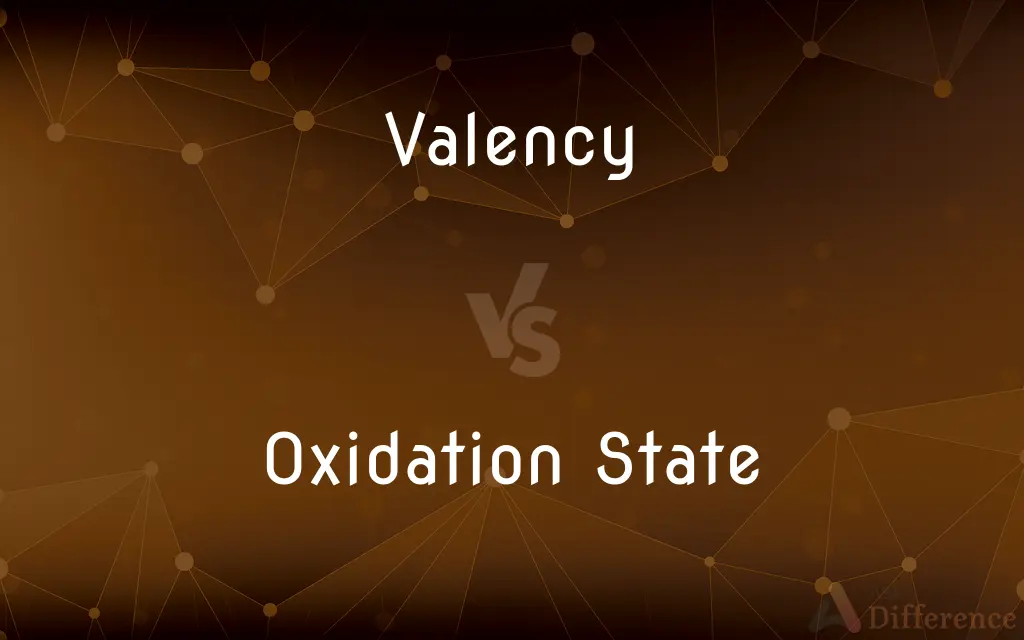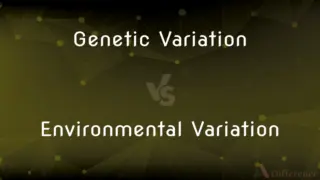Valency vs. Oxidation State — What's the Difference?
By Tayyaba Rehman — Published on November 16, 2023
Valency denotes an element's electron sharing, gaining, or losing capacity, while Oxidation State indicates a theoretical charge, assuming shared electrons are fully possessed by the more electronegative atom.

Difference Between Valency and Oxidation State
Table of Contents
ADVERTISEMENT
Comparison Chart
Definition
Combining capacity of an element.
Hypothetical charge of an atom in a compound.
Nature
Actual bonding ability.
Theoretical charge based on electron ownership.
Changeability
Generally constant for an element across compounds.
Can vary depending on the compound and environment.
Use
Determines how atoms bond in compounds.
Crucial in redox reactions to identify electron donors and acceptors.
Relation to Electronegativity
Not directly related.
Defined by full ownership of shared electrons by the more electronegative atom.
ADVERTISEMENT
Compare with Definitions
Valency
Representation of electrons an atom can lose, gain, or share.
Sodium, with a valency of one, readily loses an electron.
Oxidation State
Important for identifying redox reactions.
Reduction involves a decrease in oxidation state.
Valency
Guide to atomic interactions in compounds.
Hydrogen's valency of one lets it bond with various elements.
Oxidation State
Reflects electron distribution in compounds.
Valency
Indicator of an element's stability through bonding.
Noble gases have a valency of zero, showing their lack of reactivity.
Oxidation State
Can differ for an element in various compounds.
Chromium can exhibit multiple oxidation states, like +3 or +6.
Valency
Number of bonds an atom can form.
Chlorine has a valency of one, often bonding with metals.
Oxidation State
Theoretical charge of an atom in a compound.
Valency
Variant of valence.
Oxidation State
Measure of electron loss, gain, or sharing.
Valency
Senseid|en|chemistry}}{{alternative form of valence
Valency
The capacity of something to combine with other things, as for example the capability of a vaccine as measured by the number of pathogen serotypes that it can counteract.
Vaccine valency
Valency
The number of edges connected to a vertex in a graph.
Valency
Senseid|en|linguistics}}{{alternative form of valence
Valency
(uncountable) Importance, significance.
Valency
See Valence.
Valency
The phenomenon of forming chemical bonds
Valency
(biology) a relative capacity to unite or react or interact as with antigens or a biological substrate
Valency
(chemistry) a property of atoms or radicals; their combining power given in terms of the number of hydrogen atoms (or the equivalent)
Valency
Combining ability of an element.
Carbon's valency of four allows it to form diverse compounds.
Common Curiosities
How does Oxidation State differ from Valency?
Oxidation State gives a theoretical charge of an atom in a compound, while Valency showcases actual bonding ability.
What is Valency?
Valency represents an element's combining capacity, highlighting its ability to bond with other elements.
Is Valency constant for an element?
Generally, Valency remains consistent for an element across different compounds.
Can Oxidation State vary?
Yes, Oxidation State can change based on the compound and environment.
Can Valency help predict chemical reactions?
Yes, knowing an element's Valency can give insights into its potential reactions with other elements.
Can an element have a Valency of zero?
Yes, elements like noble gases have a Valency of zero due to their full electron shells.
Does the absolute value of Oxidation State always match Valency?
Not always, especially in complex compounds and with transition metals.
Do all elements exhibit Oxidation State?
Most elements do, especially when they form compounds. However, noble gases typically don't, given their lack of reactivity.
How is Valency determined?
Valency is derived from the number of electrons an atom can lose, gain, or share.
Which concept is older, Valency or Oxidation State?
Valency is an older concept, while Oxidation State was introduced later as chemistry evolved.
Why might two elements with the same Oxidation State react differently?
Other factors, such as atomic size and electronegativity, influence an element's reactivity.
Why is Oxidation State essential in redox reactions?
It helps identify electron donors (reducing agents) and acceptors (oxidizing agents).
How can an element have multiple Oxidation States?
Different compounds and environments can cause an element, especially transition metals, to exhibit varying oxidation states.
How are Valency and Oxidation State related to an atom's electron configuration?
Both concepts are rooted in an atom's electron interactions, whether through bonding (Valency) or hypothetical electron distribution (Oxidation State).
What does a negative Oxidation State indicate?
It suggests the atom has gained electrons compared to its neutral state.
Share Your Discovery

Previous Comparison
Genetic Variation vs. Environmental Variation
Next Comparison
Fixtures vs. FittingsAuthor Spotlight
Written by
Tayyaba RehmanTayyaba Rehman is a distinguished writer, currently serving as a primary contributor to askdifference.com. As a researcher in semantics and etymology, Tayyaba's passion for the complexity of languages and their distinctions has found a perfect home on the platform. Tayyaba delves into the intricacies of language, distinguishing between commonly confused words and phrases, thereby providing clarity for readers worldwide.














































